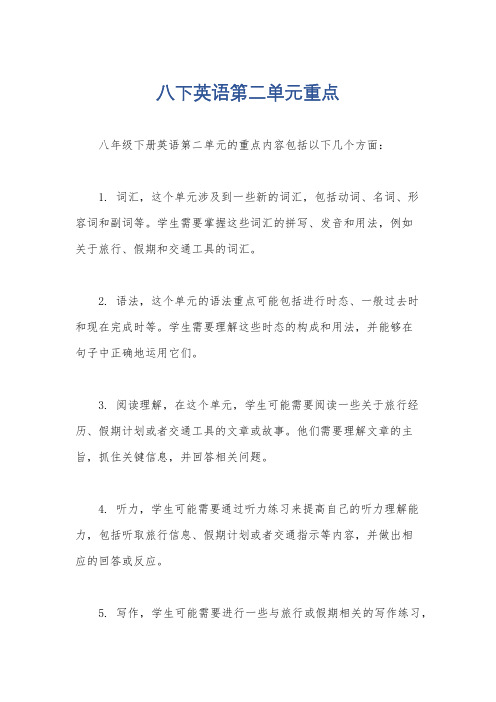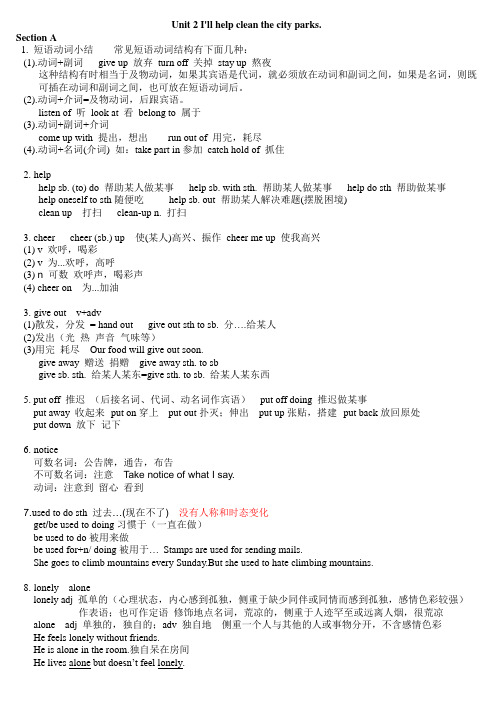八年级下Unit2单元知识点总结
完整版)人教版八年级英语下册第二单元知识点归纳总结

完整版)人教版八年级英语下册第二单元知识点归纳总结Unit 2: I'll Help Clean Up the City ParksIn our community。
we have many beautiful parks that we can enjoy。
However。
sometimes people leave trash and litter behind。
which can make the parks look messy and uninviting。
That's why I'm excited to help clean up the city parks with my friends。
We plan to set up a le and make a plan to clean up different parks each week。
We'll gather our XXX each other up as we work to make a difference in our community。
We'll also give out flyers and talk to people in the community to encourage them to help keep the parks clean。
We believe that if we all work together。
we can make it possible for everyone to enjoy the parks in a clean and safe environment。
I used to think that one person couldn't make a difference。
but I've XXX caring for our community。
八下英语第二单元重点

八下英语第二单元重点
八年级下册英语第二单元的重点内容包括以下几个方面:
1. 词汇,这个单元涉及到一些新的词汇,包括动词、名词、形
容词和副词等。
学生需要掌握这些词汇的拼写、发音和用法,例如
关于旅行、假期和交通工具的词汇。
2. 语法,这个单元的语法重点可能包括进行时态、一般过去时
和现在完成时等。
学生需要理解这些时态的构成和用法,并能够在
句子中正确地运用它们。
3. 阅读理解,在这个单元,学生可能需要阅读一些关于旅行经历、假期计划或者交通工具的文章或故事。
他们需要理解文章的主旨,抓住关键信息,并回答相关问题。
4. 听力,学生可能需要通过听力练习来提高自己的听力理解能力,包括听取旅行信息、假期计划或者交通指示等内容,并做出相
应的回答或反应。
5. 写作,学生可能需要进行一些与旅行或假期相关的写作练习,
比如写一篇关于自己假期计划的短文或者写一封给朋友的电子邮件,分享旅行经历。
总的来说,这个单元的重点是让学生掌握与旅行、假期和交通
工具相关的词汇、语法和表达能力,培养他们的阅读理解和听力理
解能力,同时提高他们的写作能力。
希望这些内容能够帮助你更好
地理解这个单元的重点。
八年级英语下册1·2单元知识点汇总

Unit 1 What’s the matter?一、基础知识1.What’s the matter? 怎么啦?出什么事情了?【解析】matter/ ' mætə(r)) /n.问题;事情What’s the matter with you?= What’s the trouble with you? = What’s wrong with you?你怎么了?【注】:matter 和trouble 为名词,其前可加the 或形容词性物主代词,wrong 是adj. 不能加the【用法】用于询问某人有什么病或某人遇到什么麻烦、问题其后跟询问对象时,与介词with 连用。
即:What’s the matter with sb.? = What’s your trouble?= What’s up? = What happens to sb.?—What’s the matter with you ? —I have a bad cold.2.I had a cold.我感冒了。
have a cold=catch a cold=have the flu感冒have a fever 发烧have a cough咳嗽have a stomachache胃疼,肚子疼have a toothache牙疼have a headache头疼3.身体部位+ache(疼痛)构成新的复合词stomach+ache=stomachachehead+ache=headachetooth+ache=toothacheback+ache=backache后背痛4.much too+ 形容词,意为太...... ,too much+名词,意为很多,大量。
5.enough【形容、副词】足够的/地,enough放在名前后,形副后。
good enough足够好enough money=much money6.lie down躺下,lie 躺,躺着,过去式lay;lie说谎,过去式lied7.maybe ―或许‖,常用于句首,表示可能性,后加句子。
Unit 2 单元知识点复习 2022-2023学年人教版英语八年级下册

人教版英语八年级下册第二单元知识点过关Unit 2 I ’ll help to clean up the city parks.一、重点短语1. Clean-Up Day 清洁日、大扫除2. an old people’s home 一家养老院3. help out with sth. 帮助解决困难;例如:What did they ask you to help out with他们叫你帮忙做什么?ed to 曾经…、过去;例如:I used to be a shy girl . 我过去是个害羞的女孩儿。
5.care for 关心、照顾;例如:Every year , the volunteers spend two months caring for the old in the old people’s home. 每年,志愿者们花两个月时间去养老院照顾老人。
6. the look of joy 快乐的表情;例如:The teacher was happy to see the look of joyon her students’ faces. 老师很高兴看到学生们脸上快乐的表情。
7. at the age of 在......岁时;例如:The little boy could dress himself at the age of three. 这个小男孩在三岁的时候就可以自己穿衣服了。
8.clean up 打扫(或清除)干净9. cheer up (使)变得更高兴;例如:Don’t be sad , cheer up , life is full of sunshine.不要悲伤了,高兴起来吧,生活充满了阳光。
10. give out 分发、散发,同义词hand out11. come up with 想出、提出;例如:The clever boy can always comes up some good ideas. 这个聪敏的男孩儿总能想出一些好主意。
八下英语二单元知识点

八下英语二单元知识点八年级下册英语第二单元主要围绕着“日常活动”这一主题展开,涉及了学生们在学校和家中进行的各种活动,包括学习、运动、娱乐等。
以下是本单元的重点知识点详解,帮助同学们更好地掌握和运用所学知识。
一、重点词汇日常活动类词汇:study(学习)、play(玩耍)、eat(吃)、sleep(睡觉)、wash(洗漱)、shop (购物)等。
学校生活相关词汇:class(课程)、homework(作业)、test(考试)、library(图书馆)、playground (操场)等。
运动类词汇:swim(游泳)、play tennis(打网球)、ride a bike(骑自行车)、climb mountains (爬山)等。
频度副词:always(总是)、usually(通常)、often(经常)、sometimes(有时)、never(从不)等。
二、重点短语日常活动短语:go to the movies(去看电影)、go shopping(去购物)、play computer games (玩电脑游戏)、do housework(做家务)等。
学校生活短语:have a test(参加考试)、go to the library(去图书馆)、play sports(做运动)、after-school activities(课后活动)等。
运动类短语:play tennis with sb.(和某人一起打网球)、go swimming(去游泳)、ride a bike to school(骑自行车上学)等。
三、重点句型询问某人通常做什么活动的句型:What do you usually do on weekends? 你周末通常做什么?描述某人一周内活动安排的句型:On Monday, I usually ... 周一我通常……;On the weekend, I sometimes ... 周末我有时……使用频度副词谈论日常活动的句型:I always get up at 6:30 in the morning. 我总是早上6:30起床。
人教版八年级下册英语Unit 2知识点汇总

人教版八年级下册英语Unit 2知识点汇总一、常考短语clean up 打扫(或清除)干净cheer up(使)变得更高兴;振奋起来give out 分发;散发come up with 想出提出(主意、计划、回答等)put off 推迟hand out 分发call up 打电话给(某人);征召used to曾经……“;过去…care for照顾;非常喜欢try out参加………选拔;试用fix up修理;装饰give away赠送;捐赠take after(外貌或行为)像set up 建起;设立make a difference 影响;有作用put up 张贴;搭建;举起help out 帮助……摆脱困境give up 放弃come true 实现run out of 用尽;耗尽be similar to 与………相似volunteer to do sth 自愿做某事make plans to do sth 制订计划做某事ask sb (not) to do sth 要求某人(不要)做某事used to do sth 过去常常做某事give up+时间+to do sth腾出时间做某事get a feeling of 产生…的感觉decide to do sth 决定做某事help sb (to) do sth帮助某人做某事make a difference to对…产生影响make it possible for sb to do sth使得做某事对某人来说成为可能三、经典句型1.You could help to clean up the city parks. A(9)你可以帮助打扫城市公园。
(1)could意为“能;可以”,其后接动词原形,可以用于提出建议,语气比can委婉。
You could walk to the park.你可以步行去公园。
拓展:could表示过去的能力时,是can的过去式。
八年级下册第二单元知识点梳理

八年级下册第二单元知识点梳理初中英语PEP人教版知识归纳Unit2I’ll help to clean up the city parks.【重点单词】clean up 打扫(清除)干净cheer [tʃiə] v. 欢呼cheer up 变得更高兴,振奋起来give out 分发,散发volunteer [ˌvɔlənˈtiə] n. & v. 志愿者;义务做come up with 想出,提出put off 推迟sign [saɪn] n. 标记,符号,标牌notice [ˈnəʊtɪs] n. & v. 通知,公告;注意到hand out 分发call up 打电话给…某人,征召used to do sth. 过去常常做某事lonely ['ləʊnlɪ] adj. 孤独的,寂寞的care for 照顾,非常喜欢several [ˈsevrəl] prep. 几个,数个,一些strong [strɒŋ] adj. 强壮的,强烈的feeling [ˈfi:lɪŋ] n. 感觉,感触satisfaction [ˌsætɪs'fækʃn] n. 满足,满意joy [dʒɔɪ] n. 高兴,愉快owner [ˈəʊnə(r)] n. 所有者,物主try out 参加…选拔,试用journey ['dʒɜ:nɪ] n. (尤指长途)旅行,行程raise [reɪz] v. 抬起,举起,筹集,征集alone [əˈləun] adv. 独自地,孤独地repair [riˈpɛə] v. 修理,修补fix [fiks] v. 修理,安装fix up 修理,修补give away 赠送,捐赠take after (外貌或行为)像broken ['brəʊkən] adj. 破损的,残缺的wheel [wi:l] n. & v. 轮子,车轮;旋转letter [ˈletə] n. 信件,字母Miss [mɪs] n. 小姐set up 建立,设立disabled [disˈeibəld] adj. 有残疾的,丧失能力的make a difference 影响,有作用blind [blaɪnd] adj. 盲的,盲目的,失明的deaf [def] adj. 聋的imagine [ɪˈmædʒɪn] v. 想象,设想difficulty ['dɪfɪkəltɪ] n. 困难open [ˈəʊpən] v. 打开door [dɔ:] n. 门carry ['kærɪ] v. 携带,搬运train [treɪn] v. 训练,培养training [ˈtreɪnɪŋ] n. 训练,培训excited [ɪkˈsaɪtɪd] adj. 激动的,兴奋的kindness [ˈkaɪndnəs] n. 仁慈,善良,亲切,善意clever [ˈklevə] adj. 聪明的,机灵的understand [ˌʌndəˈstænd] v. 懂,理解change [tʃeɪndʒ] n. & v. 改变interest ['ɪntrəst] n. & v. 感兴趣;兴趣sir [sɜ:(r)] n. 先生madam ['mædəm] n. 夫人,女士【重点短语】1.Clean-Up Day 清洁日2. an old people’s home 养老院3. help out with sth.帮助解决困难4. used to过去常常......5. care for 关心;照顾6. the look of joy 快乐的表情7. at the age of 在......岁时8.clean up 打扫(或清除)干净9. cheer up (使)变得更高兴;振奋10. give out 分发;散发11. come up with 想出;提出12. make a plan 制订计划13. make some notices 做些公告牌14. try out 试用;试行15. work for 为…工作;为…. 效力16. put up 建造;举起;张贴17. hand out 分发;散发;发给18. call up 打电话;召集19. put off 推迟;延迟20. for example 比如;例如21. raise money 筹钱;募捐22. take after 与......相像;像23. give away 赠送;捐赠24. fix up 修理;修补;解决25. be similar to 与……相似26. set up 建立;设立27. disabled people 残疾人28. make a difference 影响;有作用29. be able to 能够30. after-school reading program 课外阅读项目【重点句型】1. The boy could give out food at the food bank. 这个男孩可以在食品救济站分发食物。
新版新目标英语八年级下册unit2知识点总结

Unit 2 I'll help clean the city parks.Section A1. 短语动词小结常见短语动词结构有下面几种:(1).动词+副词give up 放弃turn off 关掉stay up 熬夜这种结构有时相当于及物动词,如果其宾语是代词,就必须放在动词和副词之间,如果是名词,则既可插在动词和副词之间,也可放在短语动词后。
(2).动词+介词=及物动词,后跟宾语。
listen of 听look at 看belong to 属于(3).动词+副词+介词come up with 提出,想出run out of 用完,耗尽(4).动词+名词(介词) 如:take part in参加catch hold of 抓住2.helphelp sb. (to) do 帮助某人做某事help sb. with sth. 帮助某人做某事help do sth 帮助做某事help oneself to sth随便吃help sb. out 帮助某人解决难题(摆脱困境)clean up 打扫clean-up n. 打扫3. cheer cheer (sb.) up 使(某人)高兴、振作cheer me up 使我高兴(1) v 欢呼,喝彩(2) v 为...欢呼,高呼(3) n 可数欢呼声,喝彩声(4) cheer on 为...加油3.give out v+adv(1)散发,分发= hand out give out sth to sb. 分….给某人(2)发出(光热声音气味等)(3)用完耗尽Our food will give out soon.give away 赠送捐赠give away sth. to sbgive sb. sth. 给某人某东=give sth. to sb. 给某人某东西5. put off 推迟(后接名词、代词、动名词作宾语)put off doing 推迟做某事put away 收起来put on穿上put out扑灭;伸出put up张贴,搭建put back放回原处put down 放下记下6.notice可数名词:公告牌,通告,布告不可数名词:注意Take notice of what I say.动词:注意到留心看到ed to do sth过去…(现在不了) 没有人称和时态变化get/be used to doing习惯于(一直在做)be used to do被用来做be used for+n/ doing被用于…Stamps are used for sending mails.She goes to climb mountains every Sunday.But she used to hate climbing mountains.8.lonely alonelonely adj 孤单的(心理状态,内心感到孤独,侧重于缺少同伴或同情而感到孤独,感情色彩较强)作表语;也可作定语修饰地点名词,荒凉的,侧重于人迹罕至或远离人烟,很荒凉alone adj 单独的,独自的;adv 独自地侧重一个人与其他的人或事物分开,不含感情色彩He feels lonely without friends.He is alone in the room.独自呆在房间He lives alone but doesn’t feel lonely.9.volunteer(1)可数名词志愿者(2)adj. 自愿的(3) v volunteer to do sth 志愿效劳、主动贡献They are the Chinese People’s V olunteers. 他们是中国人民志愿军。
- 1、下载文档前请自行甄别文档内容的完整性,平台不提供额外的编辑、内容补充、找答案等附加服务。
- 2、"仅部分预览"的文档,不可在线预览部分如存在完整性等问题,可反馈申请退款(可完整预览的文档不适用该条件!)。
- 3、如文档侵犯您的权益,请联系客服反馈,我们会尽快为您处理(人工客服工作时间:9:00-18:30)。
2015年新目标英语八年级下册Unit2单元总结提升一、短语荟萃1.clean up打扫卫生2.cheer up变得更高兴;振奋起来3.give out分发;散发e up with提出;想出5.put off推迟6.hand out分发7.call up打电话给;征召ed to曾经……;过去……9.care for照顾;非常喜欢10.try out参加……选拔;试用11.fix up修理;装饰12.give away赠送;捐赠13.take after像14.set up建起;设立15.make a difference影响;有作用16.make a plan/make plans制定计划17.at the age of…在……岁时e true实现19.at the same time同时20.put up张贴21.be worried about担心22.be similar to与……相似23.would like to do sth.想做……24.be able to能够25.because of因为25.thank sb. for 因……而感谢某人26.be interested in对……感兴趣27.be good at/do well in /be strong in擅长28.on the phone在打电话29.work out产生出二、用法集萃1.make it+形容词(+for sb.)+to do sth.(使某人)做某事成为……2.need to do sth.需要做某事3.make plans to do sth.制定计划做某事4.ask sb.(not) to do sth.要求某人(不要)做某事ed to do sth.过去常常做某事6.give up+时间+to do sth.腾出时间去做某事7.get a feeling of…有……的感觉8.decide to do sth.决定做某事9.help sb. (to) do sth.帮助某人做某事10.make a difference to对……产生影响三、句型总汇Section A 1.You could help to clean up the city parks.你可以帮助打扫城市公园。
2.The girl could visit the sick kids in the hospital to cheer them up. 女孩可以探望医院里生病的孩子们,使他们高兴起来。
3.The boy could give out food at the food bank. 男孩可以在食品库分发食物。
4. The girl could volunteer in an after—school study program to teach kids.女孩可以义务在课外学习活动中教孩子们。
5. We need to come up with a plan for the City Park Clean—Up Day.我们需要为城市公园清洁日想出一个计划。
6. Oh, what did they ask to help out with?哦,他们让你帮忙做了什么?7.They told me stories about the past and how things used to.他们给我讲过去的故事以及事情曾经的样子。
8. Yeah, a lot of old people are lonely.是啊,很多老人都很寂寞。
9. We should listen to them and care for them.我们应该倾听他们,照顾他们。
10. Mario Green and Mary Brown from Riverside High School give up several hours each week to help others. 来自河畔高中的马里奥·格林和玛丽·布朗每周腾出几个小时的时间来帮助别人。
11. I get such a strong feeling of satisfaction when I see the animals get better and the look of joy on their owner s’ faces.当我看到动物病情好转以及它们主人脸上喜悦的神情时,我有一种强烈的满足感。
12. She could read by herself at the age of four.她四岁时就能自己阅读。
13. Last year, she decided to try out for a volunteer after—school reading program.去年,她决定参加课外阅读活动的志愿者选拔。
14. The kids are sitting in the library, but you can see in their eyes that they’re going on a different journey with each new book.虽然孩子们坐在图书馆里,但是你能从他们的眼睛里看出,他们正跟着每一本新书进行一次不同的旅行。
15. I can do what I love to do and help others at the same time.我可以做我爱做的事,同时也能帮助别人。
16. I’m too busy with my studies this year.今年我的学习太忙了。
17. Some people even stop doing their jobs for a few months to a year.一些人甚至停止工作几个月到一年。
Section B 1. I take after my mother.我长得像我妈妈。
2. I fixed it up.我把它修好了。
3. I gave it away.我把它捐了出去。
4. I’m similar to her.我和她很像。
5. I didn’t keep it.我没有留着它。
6. Jimmy fixes up broken bicycle parts, like wheels.吉米修理坏了的自行车部件,像车轮。
7. I’m sure you know that this group was set up to help disabled people like me.我确信你知道这个组是为了帮助像我这样的残疾人而建立的。
8. You helped to make it possible for me to have Lucky.你的帮助使我拥有Lucky成为可能。
9. Lucky makes a big difference to my life. Lucky使我的生活产生了很大的变化。
10. What would it be like to be blind or deaf?看不见或听不见将会是什么样子?11. Or imagine you can’t walk or use your hands easily.或者想象你不能走路或不能灵活地使用双手。
12. Most people would never think about this, but many people have these difficulties.大多数人永远不会想这些,但是很多人有这些困难。
13. I can’t use my arms or legs well, so normal things like answering the telephone, opening and closing doors, or carrying things are difficult for me. 我不能灵活地使用胳膊和腿,所以像接电话、开关门或提东西这些平常的事对我来说都很困难。
14. She talked to Animal Helpers about getting me a special trained dog.她跟“动物助手”谈了谈关于给我一条经过特殊训练的狗的事情。
15. I love animals and I wasexcited about the idea of having a dog.我喜欢动物,而且我对拥有一条狗这个想法感到兴奋。
16. After six months of training with a dog at Animal Helpers, I was able to bring him home.在“动物助手”那里和一条狗一起训练了6个月后,我终于能把它带回家了。
17. I’ll send you a photo of him if you like, and I could show you how he helps me.如果你喜欢,我将寄给你一张它的照片,我还可以向你展示它是怎么帮助我的。
18. I’m good at/ I’m strong in/ In my free time, I like to… so I think I’d be good at this job.我擅长……/……是我的强项/在我的空闲时间,我喜欢……因此我认为我会擅长这份工作。
四、提供帮助的交际用语1.What are you going to do when you see the hungry people?当看到饥饿的人,你将做什么?2.What kind of volunteer work do you think you could do?你认为你能做哪种义务工作?3. What would you like to do to help the homeless people?你想做什么帮助无家可归的人?4. If you see these things or problems, what will you do?如果看到这些事情或问题,你将会做什么?5. I’m going to set up a food bank/a charity to help the hungry people.我打算建立一个食品救济站/一个慈善机构来帮助饥饿的人。
6. I will work outside.我将出去工作。
7. You could help clean up the city parks.你可以帮助打扫城市公园。
8. You could help kids with their schoolwork.你可以帮助孩子们学习功课。
